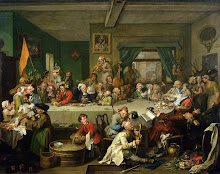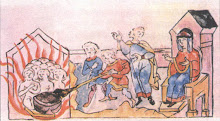Regarding that column in today's Guardian : Hart claims that I have “made a crusade of attacking anyone who writes about Poe.” No. I have read enough about Poe, and done enough research into his life to know that he has often been maligned by history. I try to correct misrepresentations and lies, and those are what I attack. I don’t think of myself as someone who attacks others for sport. (Incidentally, anyone reading this blog’s archives will notice that there are writers--both in fiction and nonfiction--that I’ve gratefully praised. It is particularly ironic that Hart would make this charge, as when I first heard of her book, I posted that I hoped I would like it, and at first--before I reread “Young Mrs. Poe”--I did like certain things about her novel, and said so.)
Hart also says, “if you know the sources…then you certainly might say, I and the previous author are both guilty of sticking to our sources.” You certainly might say anything you want, but the truth is that, as there is very little historical documentation about Virginia Poe, Cothburn O’Neal fabricated much of his book from whole cloth. As I have said before, he invented several incidents which were reproduced in Hart’s novel--incidents which do not appear in any “sources.” I am curious to know if Hart can produce any specific examples where I criticized her for merely “sticking to our sources.”
When Hart accuses me of posting text that was “altered, edited, and in some cases even transposed…to make it more closely resemble [O’Neal]” I take offense. Many of the words I copied don’t just resemble O’Neal’s, they’re identical. I, as well as the friend who helped me compile the quotations I used, want only to present an honest and unbiased case, not start a “crusade.” I have repeatedly urged everyone interested in this issue to read the two novels themselves, and come to their own conclusions. However, if Hart can give me any specific examples of where I erred in describing her book, I will instantly and humbly apologize. Unlike some writers, I am always ready to concede when I am in the wrong.
P.S. I'm reminded of yet another passage Poe wrote during his "Little Longfellow War":
“But to be serious; if Outis has his own private reasons for being disgusted with what he terms the ‘wholesale mangling of victims without rhyme or reason,’ there is not a man living, of common sense and common honesty, who has not better reason (if possible) to be disgusted with the insufferable cant and shameless misrepresentation practiced habitually by just such persons as Outis, with the view of decrying by sheer strength of lungs--of trampling down--of rioting down--of mobbing down any man with a soul that bids him come out from among the general corruption of our public press, and take his stand upon the open ground of rectitude and honor.”
“The Outises who practice this species of bullyism…are either the ‘victims without rhyme or reason who have been mangled by wholesale,’ or they are the relatives, or the relatives of the relatives of the ‘victims without rhyme or reason who have been mangled by wholesale.’ Their watchwords are ‘carping littleness,’ ‘envious malignity,’ and ‘personal abuse.’ Their low artifices are insinuated calumnies, and indefatigable whispers of regret, from post to pillar, that ‘Mr. So-and-So, or Mr. This-and-That will persist in rendering himself so dreadfully unpopular’--no one, in the meantime, being more thoroughly and painfully aware than these very Outises, that the unpopularity of the just critic who reasons his way, guiltless of dogmatism, is confined altogether within the limits of the influence of the victims without rhyme and reason who have been mangled by wholesale.”
–“Imitation--Plagiarism,” “Broadway Journal” March 29, 1845
“But to be serious; if Outis has his own private reasons for being disgusted with what he terms the ‘wholesale mangling of victims without rhyme or reason,’ there is not a man living, of common sense and common honesty, who has not better reason (if possible) to be disgusted with the insufferable cant and shameless misrepresentation practiced habitually by just such persons as Outis, with the view of decrying by sheer strength of lungs--of trampling down--of rioting down--of mobbing down any man with a soul that bids him come out from among the general corruption of our public press, and take his stand upon the open ground of rectitude and honor.”
“The Outises who practice this species of bullyism…are either the ‘victims without rhyme or reason who have been mangled by wholesale,’ or they are the relatives, or the relatives of the relatives of the ‘victims without rhyme or reason who have been mangled by wholesale.’ Their watchwords are ‘carping littleness,’ ‘envious malignity,’ and ‘personal abuse.’ Their low artifices are insinuated calumnies, and indefatigable whispers of regret, from post to pillar, that ‘Mr. So-and-So, or Mr. This-and-That will persist in rendering himself so dreadfully unpopular’--no one, in the meantime, being more thoroughly and painfully aware than these very Outises, that the unpopularity of the just critic who reasons his way, guiltless of dogmatism, is confined altogether within the limits of the influence of the victims without rhyme and reason who have been mangled by wholesale.”
–“Imitation--Plagiarism,” “Broadway Journal” March 29, 1845
















